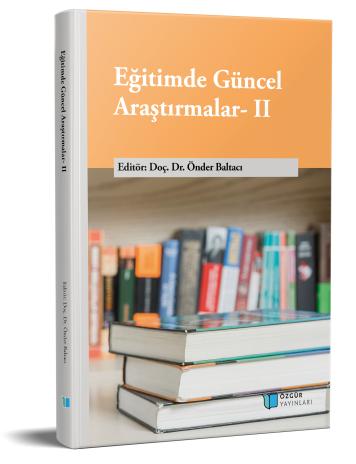
Öğretmenlerin Çok Kültürlü Eğitim Öz-Yeterliğinin Yordayıcıları: TALIS 2018 Türkiye Örneklemi
Şu kitabın bölümü:
Baltacı,
Ö.
(ed.)
2023.
Eğitimde Güncel Araştırmalar- II.
Özet
Bu araştırmanın amacı, öğretmenlerin çok kültürlü eğitim öz-yeterliğini yordayan değişkenlerin belirlenmesidir. Bu amaçla, TALIS 2018 Öğretmen Anketi’nin Türkiye örneklemine ait veri seti ele alınmıştır. Öncelikle veri setindeki cinsiyet, yaş, çalışma durumu, eğitim düzeyi, kıdem, ilk kariyer tercihi değişkenleri ile çok kültürlü eğitim öz-yeterliği arasındaki ilişkiler nokta çift serili ve Spearman korelasyon katsayısı ile t ve F testi yardımıyla incelenmiştir. Ardından, TALIS 2018 uygulamasında yer alan çok kültürlü eğitim öz-yeterlik, öğretme pratikleri, öz-yeterlik algısı, çeşitlilik pratikleri, öğretmen işbirliği ölçeklerinin model-veri uyumları doğrulayıcı faktör analizi yardımıyla, güvenirlikleri ise Cronbach Alfa ve McDonald Omega katsayıları ile belirlenmiştir. Bu ölçeklerden elde edilen puanlar arasındaki ilişkiler, ölçek puanlarının normal dağılım göstermesi sebebiyle, Pearson korelasyon katsayısı ile ortaya koyulmuştur. Analiz varsayımları test edilerek, çok kültürlü eğitim öz-yeterlik değişkeni bağımlı ve diğer ölçek puanları ile bağımlı değişkenle ilişkili olduğu görülen kıdem ve ilk kariyer tercihi dummy değişkenleri bağımsız değişkenler olacak şekilde çoklu regresyon analizi gerçekleştirilmiştir. Analiz sonuçlarına göre, yaş, kıdem ve ilk kariyer tercihi değişkenleri ile öğretmenlerin çok kültürlü eğitim öz-yeterliği arasında düşük düzeyde fakat anlamlı ilişkiler olduğu; cinsiyet, çalışma durumu, eğitim düzeyi ile çok kültürlü eğitim öz-yeterliği arasında manidar bir ilişki bulunmadığı görülmüştür. Öğretmenlerin çok kültürlü eğitim öz-yeterlikleri ile öğretme pratikleri, öz-yeterlik algısı, çeşitlilik pratikleri, öğretmen işbirliği değişkenlerinin ise orta düzeyde manidar ilişkiler gösterdiği tespit edilmiştir. Çoklu regresyon analizi sonucunda, öğretmenlerin çok kültürlü eğitim öz-yeterliklerinin en güçlü yordayıcılarının sırasıyla öğretmen öz-yeterliği, öğretme pratikleri, çeşitlilik pratikleri, kıdem ve öğretmen işbirliği olduğu sonucuna ulaşılmıştır. Bu değişkenlerin bir arada bağımlı değişkendeki varyansın ancak %22’sini açıklayabildiği görülmüştür.

